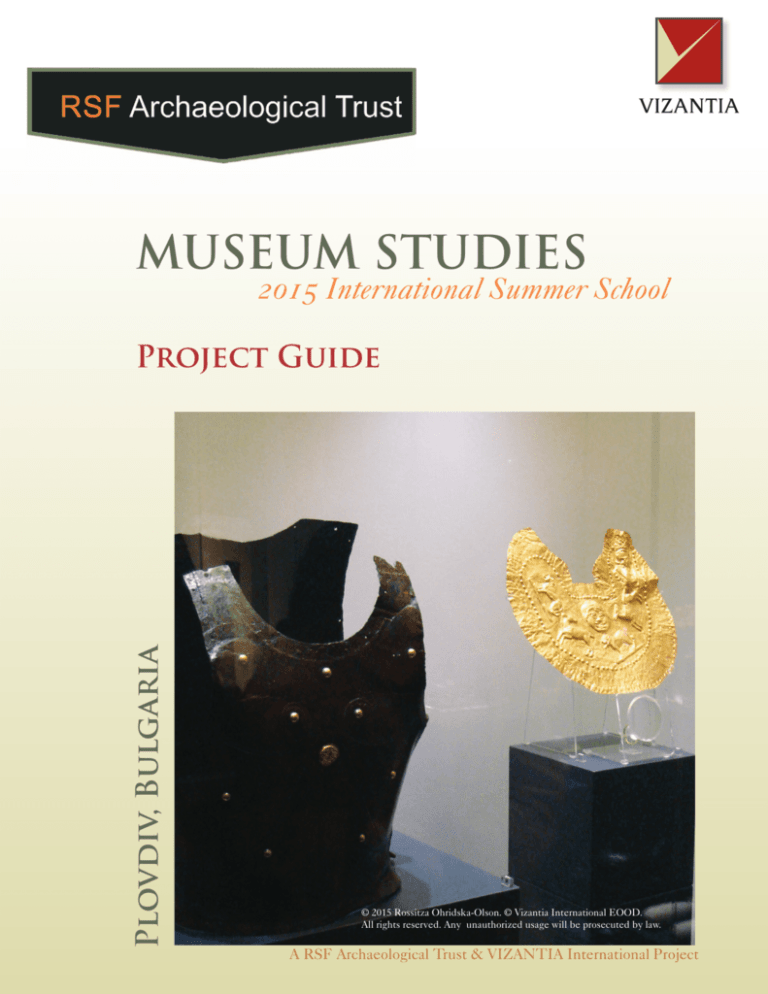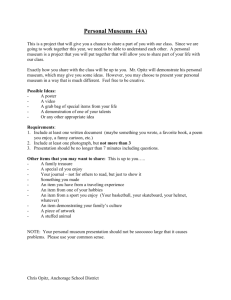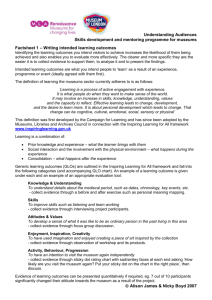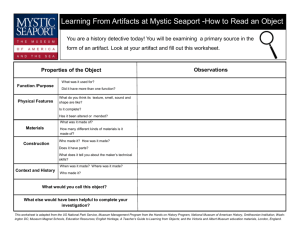
MUSEUM STUDIES
2015 International Summer School
Plovdiv, Bulgaria
Project Guide
© 2015 Rossitza Ohridska-Olson. © Vizantia International EOOD.
All rights reserved. Any unauthorized usage will be prosecuted by law.
A RSF Archaeological Trust & VIZANTIA International Project
MUSEUM STUDIES
2015 International Summer School
Project Guide
Project Description
This international summer school in museum studies in English is the first one in Eastern Europe.
In this part of the world museum science had followed a specific path of development, in many aspects different from the one in Western European
and North American Museums. Bulgaria, where
the course will be based, made headlines in the
world media with past and recent discoveries,
thanks to the hundreds of the country’s museum
archaeologists.
The Bulgarian museums hold 7 million of artifacts, but only few of them are globally known
through high profile exhibitions in the Louvre,
Metropolitan, and other famous institutions. The
students will have the chance not only to see many
of these artifacts in their home museums, but also
to visit the sites of their discoveries and meet with
the people who made possible showcasing the
Millennial history of Europe in museums around
the world.
Project Scope
The project aims to introduce students to basic
principles, methodology and marketing of museums as cultural, research and educational institutions. The focus of this 14-days International
Summer School are European archaeological and
history museums, holding artifacts from Neolithic
times (7th millennium B.C.E) to the Middle Ages
(14th C. C.E).
The project includes extensive theoretical knowledge in all aspects of museum organization, management and communications. Intensive practical
work (on site in museums and during field trips
and excursions) will give a hands-on experience
on museum collections, tracing the artifacts from
field to exhibition. Special emphasis will be made
on collaborative work between students, museum
staff, archeologists, historians and lecturers.
© 2015 Rossitza Ohridska-Olson. © Vizantia International EOOD.
All rights reserved. Any unauthorized usage will be prosecuted by law.
The individual involvement through in depth research on crucial themes in museum studies and
best practices will lead the students to final personalized course experience and preparation for
further publications in this exiting field.
MUSEUM STUDIES
2015 International Summer School
Project Guide
International Summer School Sessions & Prices
Session Dates
Historical period covered
1
June 20th, 2015 - Neolithic, Chalcolithic, Bronze Age,
July 3rd, 2015
Classical Greece, Roman Empire, Eastern
Roman Empire (Byzantium)
2
July 4th, 2015 - Classical Greece, Roman Empire, Eastern
July 18, 2015
Roman Empire (Byzantium), Middle Ages
3
July 18, 2015 - Neolithic, Chalcolithic, Bronze Age,
July 31, 2015
Classical Greece, Roman Empire, Eastern
Roman Empire (Byzantium)
4
August 1, 2015 - Classical Greece, Roman Empire, Eastern
August 14, 2015 Roman Empire (Byzantium), Middle Ages
PRICE
EUR 1390
(App. 1510 US Dollars)
EUR 1590
(App. 1710 US Dollars)*
EUR 1490
(App. 1610 US Dollars)
EUR 1490
(App. 1610 US Dollars)
PLEASE NOTE: Prices in US Dollars are approximative. Before making a payment, please check the current exchange rate with your bank. Prices are valid for a minimum of 6 participants.
* Includes 4th of July Celebration & Gala Dinner
Discounts & Add-ons
Double session discount
Next year yearly booking for any of RFS/Vizantia
International Summer School Program
Single Supplement/ additional night in the same
hotel
Less than minimum participants supplement
Deluxe 4 stars hotel supplement
Amounts/percentages
- 10% per person
- 10% per person
190 EUR (App. 210 US dollars) per person single supplement. Additional night (double occupancy) 25 EUR,
single occupancy: 35 EUR
290 EUR (App. 315 US dollars) per person
250 EU (double occupancy), 150 EUR (single supplement) per person
Academic Credits
Session
For 1 session
For 2
sessions
Credits
6
9
* Additional fees may apply
EU Students
EUR 280
EUR 420
Other International
Students
EUR 340 (Approx.. 370 US dollars)
EUR 510 (Approx... 560 US dollars)
© 2015 Rossitza Ohridska-Olson. © Vizantia International EOOD.
All rights reserved. Any unauthorized usage will be prosecuted by law.
MUSEUM STUDIES
2015 International Summer School
Project Guide
Prices do not include:
Prices include:
•
•
•
•
•
•
•
•
•
Transfer from the nearest airport/bus/railway
station
Tuition fee for the entire International summer School in Museum Studies
14 overnights accommodation in 3 stars hotels
based on double occupancy
Full board (breakfast, lunch and dinner)
Mineral water with all meals and during excursions and field trips
Study materials (printed and digital), Project
Handbook and Project Guide
Excursions as per the detailed program
All entrance fees in museums and cultural heritage sites as per the detailed program
Museum studies International Summer
School Certificate of attendance
•
•
•
•
•
•
•
•
•
•
•
•
International travel to/from home country
Personal expenses (laundry, other beverages
than mineral water, telephone, etc.)
Medical expenses
Medical insurance
Travel insurance
Tips to local waiters, maids in hotels and other
service personnel
Entertainment expenses: concerts, clubs, etc.
Single room occupancy
Credit hours
Personal travel in the free time
Personal visits to museums and attractions not
included in the program.
Wine Tasting trips
International Summer School Facts in a glance
Topic
Locations
Short Description
Main location: Plovdiv
Field trips locations: Assenovgrad, Hissarya
Academic Hours
33 Theory
57 Practicum (Field visits to museums, archaeological digs, research
institutions, research in libraries, workshops, home work)
Excursions
Kazanluk and the Valley of the Thracian Kings (featured in the 2015
“Saga of the Thracian Kings” exhibition in the Louvre museum)
Karanovo - the open-air museum of a Thracian Chariot, featured in the
Archaeology Magazine
Nessebar - UNESCO World Cultural Heritage list town on the Black
Sea Coast
Stara Zagora - the Neolithic Dwellings on site-prehistoric art exhibition, UNESCO World Cultural Heritage Tentative List
Travel
All travel services are provided by licensed and bonded tour operator
or/and travel agency. See additional information in the International
Summer School Travel Guide
Credits (payment and special con- 6 credits for 1 session
ditions apply)
9 credits for double session
© 2015 Rossitza Ohridska-Olson. © Vizantia International EOOD.
All rights reserved. Any unauthorized usage will be prosecuted by law.
MUSEUM STUDIES
2015 International Summer School
Travel Guide
International Summer School Locations & Places to Visit
Bulgaria
Bulgaria has been a crossroads of civilizations since
the dawn of the human history. Travelers from
Antiquity to modern times have praised the mastery
of its craftsmen, the bravery of its warriors, the superiority of its wines, the enchantment of its majestic
mountains, and the passion of its welcoming people.
Bulgaria is also a country of treasures: from the oldest
gold in the World in Varna, created by a mysterious civilization dating 7 thousand years ago to the Thracian
gold & silver artifacts scattered across Bulgarian museums. Frescoes in Thracian royal tombs dating 25
centuries ago, painted churches and monasteries from
all epochs of the Christianity are feast for the eye and
a surviving proof of the artistic genius and spirituality of the people living on the Bulgarian lands.
The country is mixture of history and modernity,
of East and West. All programs of the International
Summer Universities include interaction with local people, intensive immersion in the culture
and traditions of the land and the most innovative
knowledge in the field of study. The RSF/Vizantia
International Summer Universities programs
are also starting point to find new dimensions of
Bulgaria – one of the places in Europe still to be
discovered.
© 2015 Rossitza Ohridska-Olson. © Vizantia International EOOD.
All rights reserved. Any unauthorized usage will be prosecuted by law.
MUSEUM STUDIES
2015 International Summer School
Travel Guide
International Summer School Locations & Places to Visit
Plovdiv
Plovdiv, was named one of the oldest cities in Europe,
continuously inhabited since of dawn of civilizations
(6th Millennia B.C.E.) From the Thracian Polpudeva,
to the Macedonian Philippopolis (the city of Philip,
the father of Alexander the Great), to the Roman
Trimontium, Plovdiv might change name, but never
changes its majestic presence on the banks of Maritza
River (the ancient Hebrus). During the Roman
times, the city was capital of the Roman Province of
Thrace, attracting richness and culture, visible at every corner until nowadays. Famous throughout the
antiquity, visited by Alexander the Great, several
Roman Emperors, the French poet Lamartine, and
contemporary movie stars, now the second largest city in Bulgaria, Plovdiv is a vibrant art center of national importance, proudly deserving the
title of European Capital of Culture 2019. The
Old Plovdiv (UNESCO Tentative World Cultural
Heritage List) is a charming place with 18 to 19
C. architecture, attracting visitors from around the
world in its picturesque Bulgarian Revival houses,
galleries, museums and antique shops. Downtown
Plovdiv with its numerous parks and the longest
pedestrian zone in Bulgaria, attracts locals and visitors with charming cafés, elegant restaurants and
boutique coffee houses.
© 2015 Rossitza Ohridska-Olson. © Vizantia International EOOD.
All rights reserved. Any unauthorized usage will be prosecuted by law.
MUSEUM STUDIES
2015 International Summer School
Travel Guide
International Summer School Locations & Places to Visit
Kazanluk
Tucked between two picturesque mountains - the
Balkans and Sredna Gora, Kazanluk is a modern town
surrounded by history. It was named “The Capital of
the Valley of the Thracian Kings”, because numerous tombs of great antique rulers from the Odrissyan
Kingdom were found around the town. Kazanluk is
famous thanks to the amazing frescoes dated 4th C.
B.C., painted by a local painter depicting the life and
death of a Thracian aristocrat in a tomb, included
in UNESCO World Heritage. In the local museum there is treasure vault room, where the visitors
can see precious objects from gold and silver from
another tomb - the one of the Seuth III. These
artifacts were displayed at the Louvre Museum,
attracting thousands of visitors. Mineral waters in
the vicinity, parks and vibrant cultural life makes
Kazanluk a charming place to live and visit.
© 2015 Rossitza Ohridska-Olson. © Vizantia International EOOD.
All rights reserved. Any unauthorized usage will be prosecuted by law.
MUSEUM STUDIES
2015 International Summer School
Travel Guide
International Summer School Locations & Places to Visit
Stara Zagora
The Linden City, Stara Zagora, was named the greenest town in Bulgaria. The city was occupied since the
down of times and can prove it: in Stara Zagora you
can see the oldest and the best-preserved Neolithic
houses in Europe dating back to the 6th Millennia
B.C. - 8 thousand years old. The city history continues through Thracian, Roman and Byzantine times to
end under the ashes of the Ottoman Empire in 19th.
C. It was rebuilt into a modern city and attracted
poets, musicians and entrepreneurs of all Southern
Bulgaria throughout the 20th C. Now you can see
perfectly preserved Roman amphitheater and mosaics, and enjoy the cultural life of opera, children
Puppet Theater, modern museums and galleries.
Green parks are everywhere, large streets framed
in linden trees, modern restaurants and cafés make
the city a perfect place to live in. Now the proud
citizens of the city are trying to prove that Stara
Zagora is the Center of the Universe. True or false,
it is still a great town to visit.
© 2015 Rossitza Ohridska-Olson. © Vizantia International EOOD.
All rights reserved. Any unauthorized usage will be prosecuted by law.
MUSEUM STUDIES
2015 International Summer School
Travel Guide
International Summer School Locations & Places to Visit
Karanovo
The small village in the Thracian plain is known to
all archeologists in Europe: you can see there the
Karanovo tell stratigraphy situ, showcasing the 7 layers
of continuous life from one of the earliest European
Neolithic cultures (6200-5500 B.C.E) throughout the
Chalcolithic (4900 to 4500 B.C.E.) to the early Bronze
age in the Balkans (4000 B.C.E). The site is used for
dating all Balkan prehistory. Recently a Thracian
Chariot from the Roman times was discovered and
made worldwide news thanks to the Archaeology
magazine. Now the entire tomb is displayed in a
open-air museum the way it was found - with the
buried horses, dogs and rich artifacts showing the
importance of the Thracian ruler once governing
these lands.
© 2015 Rossitza Ohridska-Olson. © Vizantia International EOOD.
All rights reserved. Any unauthorized usage will be prosecuted by law.
MUSEUM STUDIES
2015 International Summer School
Travel Guide
International Summer School Locations & Places to Visit
Nessebar
The Ancient city of Nessebar – once a Thracian city,
then Greek, Byzantine and Bulgarian - is certainly one
of the most picturesque and romantic towns on the
Black Sea Coast. Situated on a tiny peninsula, during
the Byzantine times the city was the Constantinople
aristocracy’s place for exile. To show off their wealth,
the Byzantine nobles built incredible churches, more
than 40 on a small 3 by 10 miles isthmus. Later, in the
19 century, the Bulgarian and Greek merchants spread
the town with charming houses, preserved until nowa-day. Because of its significance for the history of
the humanity, the Ancient City of Nessebar is included in the UNESCO World Heritage List. The
churches in Nessebar were built in the period between 6 and 14th Centuries in the “picturesque”
style, decorated with frescoes and icons, masterpieces of Byzantine and Bulgarian art and architecture. Surrounded by fancy resorts, now Nessebar
is the favorite place for a romantic SPA or sun&sea
break. Rich in cultural sites and events during the
summer, the town enjoys huge popularity among
Bulgarians and foreigners.
© 2015 Rossitza Ohridska-Olson. © Vizantia International EOOD.
All rights reserved. Any unauthorized usage will be prosecuted by law.
MUSEUM STUDIES
2015 International Summer School
Travel Guide
International Summer School Locations & Places to Visit
Hissarya
SPA town since the Antiquity, Hissarya was for the
Romans what is now Vichy for the Europeans - a
place for health and enjoyment. The town still preserves huge Roman baths, imperial palaces ruins and
fortified gates of the city. There is a Roman tomb,
rich in mosaics, showing the importance of the buried
there aristocrat. The town museum is the riches in
Bulgaria in marble votive tablets depicting nymphs.
The healing waters of Hissarya now a day are used
for kidney cures, as well as for bottled water. The
town continues to be one of the most important
SPA resorts in the Balkans.
© 2015 Rossitza Ohridska-Olson. © Vizantia International EOOD.
All rights reserved. Any unauthorized usage will be prosecuted by law.
MUSEUM STUDIES
2015 International Summer School
Travel Guide
Travel Services
For all travel services included in the corresponding
program, (hotel and restaurant reservations, transfers,
organized land transportation as per the study program), RFS/Vizantia International EOOD use subcontracted tour operators and travel agencies, who
are licensed by the Bulgarian Law and have all travel
insurance required by the European Community.
This insurance DOES cover only land travel services as per the program. It DOES NOT represent in
any kind a medical, travel or other type of individual
international travel insurance. Personal medical and
travel insurance are compulsory for all participants in
the International Summer University programs organized and managed by RFS/Vizantia International
EOOD.
Visas
EU, American and Canadian citizens, as well citizens from some other countries (see list ) do not need
visa to travel and study in the International Summer
University programs organized and managed by RFS/
Vizantia International EOOD when these programs
are based in the EU countries (See list of the EU
Countries . Citizens from outside of the EU need
passports to travel to the EU countries. Students,
who are passport holders/Citizens from countries outside of the list of countries not needing visa for the
European Union, must arrange their visa through the
corresponding embassy. Arranging the correct Visa is
the sole responsibility of the student. No visa support
documentation will be provided until all fees have
been received by RFS/Vizantia International EOOD
and a written request for visa support is signed and
sent by the student.
Practical information and disclaimers
Travel Insurance
It is advisable that students purchase travel insurance for these types of courses as any expenses you
have incurred airfare, transportation costs, hotels,
beyond the tuition and fees associated with this
course are the student’s responsibility should the
course be canceled for any reason. To compare
policies and for further information, visit the travel
insurance comparison site Insure My Trip.
Health Insurance
Well before departure, check with your doctor to
see if you need any immunizations before traveling. Immunization information can also be found
at the sites for the Center for Disease Control
and the World Health Organization International
Travel and Health. Participants should make sure
their health and accident insurance covers them
while traveling abroad. If your insurance does not
cover you, we strongly advise purchasing temporary health insurance. RFS/Vizantia International
EOOD will check for proof of health insurance
upon your arrival. No students with missing health
insurance will be admitted to the International
Summer University programs organized and managed by RFS/Vizantia International EOOD.
Disclaimer:
Participation in International Summer School include, but may not be limited to, traveling to and
from other countries, traveling to and from cities
and towns outside the student’s country of residence or citizenship, consuming the food and living
in those accommodations available in the foreign
country(ies), and living and working in cultures
MUSEUM STUDIES
2015 International Summer School
Travel Guide
Practical information and disclaimers
and with people whose living conditions, social practices and values, and even attitudes toward foreigners
may be significantly different from those in the student’s home country and culture.
•
•
•
•
•
•
•
•
Make sure you have packed laptop, camera
and all international charges
Please pack for summer, but have some warm
jacket, just in case, and for sure an umbrella
Give a copy of your passport face page to a
close family member or friend at home.
Update all immunizations for travel to the
country.
Make sure that your passport is valid for 6
months after your return.
Secure your visa if that is necessary for travel.
Acquire multiple forms of money: cash, ATM
and credit cards. Do not carry large amounts
of cash. Money belts are handy.
Keep a list of cards, account numbers, PIN
numbers and emergency card replacement
•
•
•
•
•
procedures in multiple places.
Inform your credit card/ATM provider of your
overseas travel.
Purchase international phone cards or consider
short term international coverage on your cell
phone.
Consider international data plans for your tablet or cell phone
Take all medicines with you for the trip along
with copies of all prescriptions and the generic
names of the drugs. Keep medicines in the
original labeled drugstore containers. Take extra eyeglasses or contacts and the prescription.
Contact Vizantia to book your transfer from
the nearest airport/bus station/railroad station
at least 3 days ahead.
MUSEUM STUDIES
2015 International Summer School
project guide
Project Team
Museum Studies International Summer University
Team
Our team is comprised of high profile lecturers and
scientists with numerous publications worldwide.
They will be contributing to the high scientific
quality of the education and practical knowledge
acquired by the students.
Team leader
Rossitza Ohridska-Olson
Rossitza Ohridska-Olson is an internationally recognized specialist in tourism and cultural institutions
marketing and management. M.A. in Geography of
tourism, her research interests have focused on cultural and creative tourism. Currently, she pursues
a Ph.D. degree in Organization and Management
of Cultural Heritage (expected 2015). President of
Vizantia International, a strategic consultancy company based in the USA and European Community,
she wrote and co-wrote several strategic documents
in tourism (branding, destination management and
marketing, regions in tourism, cultural heritage development programs). She has lectured on problems of museum marketing and tourism in Austria,
Bulgaria, Chile (online), Czech Republic, Greece,
Russian Federation, and Turkey. Ms. OhridskaOlson also have organized several high profile international congresses and scientific conferences in
tourism, Slavonic studies, and digital technologies
for cultural and museum marketing.
© 2015 Rossitza Ohridska-Olson. © Vizantia International EOOD.
All rights reserved. Any unauthorized usage will be prosecuted by law.
Main lecturers
Dr. Iglika Mishkova
Iglika Mishkova, Ph.D., is a researcher and curator
in the National Museum of Ethnography and the
Bulgarian Academy of Sciences. Ms. Mishkova has
a Ph.D. in history from Sophia University “Kliment
Ohridski” with specialization in Byzantine history
and museum studies. Her research interests focus
on open/participatory museums, classification and
certification of museums, religion and ritual masks
and cult objects. Dr. Mishkova has participated as a
leader or key expert in several multi-countries EC
financed projects related to museum studies and
cultural heritage.
Dr. Svetla Kazalarska
Dr. Svetla Kazalarska is chief assistant professor in
the scientific department in the “Ethno-museology”
of the National Museum of Ethnography and the
in Bulgarian Academy of Sciences. She teaches
museum studies in Sofia University “Kliment
Ohridski” and Plovdiv University “Paisiy
Hilendarski”. With a M.A. degree in cultural tourism from “George Washington” University, DC,
USA, and a Ph.D. in History and Theory of culture from Sofia University “Kliment Ohridski”, Dr.
Kazalarska has been awarded fellowships from the
Vienna (Austria) Institute for humanities, the Sofia
Institute of social sciences, and the Center for academic research in Sofia. Her research interests focus on museum studies, urban anthropology of the
post-communism cities, research and visualization
of cultural heritage in the contemporary technology environments.
MUSEUM STUDIES
2015 International Summer School
project guide
Project Team
Krassimira Luka
Founder and president of the Bulgarian Archaeology
Society, Ms. Luka has a M.A. degree in history and
archaeology from Sofia University Sofia University
“Kliment Ohridski”. Ms. Luka has been the first
archaeologist in Bulgaria to organize International
Summer Field Schools with participants from more
than 30 countries in the last 15 years. She specializes in Roman Provincial archeology and had participated in digs in more than 15 locations. She will
be lecturing on the link between archaeological objects and history and archaeological museums.
Guest lecturers
Numismatics of the Macedon Kingdoms: Ms. Dessislava
Davidova, Ph.D. in history and archaeology. Focus on
numismatics of the Macedon, Roman and East Roman
empires. Curator of the Numismatics Department of
Plovdiv Archaeology Museum
Pre-historic (Neolithic and Chalcolithic) museums in
Bulgaria: Dr. Peter Kalchev, Ph.D. in history and archaeology. Chief curator in Prehistory Department of
Stara Zagora Regional Museum of History.
Scientific paper preparation: Structure and publication tips.
Prof. Dr. Stanislav Ivanov: Vice Rector for Academic
Affairs and Research, Dean of Tourism Department,
of the International University College, Bulgaria.
Collaborating and Supporting Universities, Colleges and Organizations
Credits from International University College, Bulgaria
http://www.vumk.eu/
Other collaborating and supporting Universities, Colleges and Organizations
Bulgarian Ministry of Culture
Regional Archaeology Museum, Plovdiv
History Museum, Assenovgrad
Museum “Iskra”, Kazanluk
History and archaeology museum, Hissarya
Archaeological Museum, Nessebar, Bulgaria
Municipality of Plovdiv
Municipality of Nessebar






